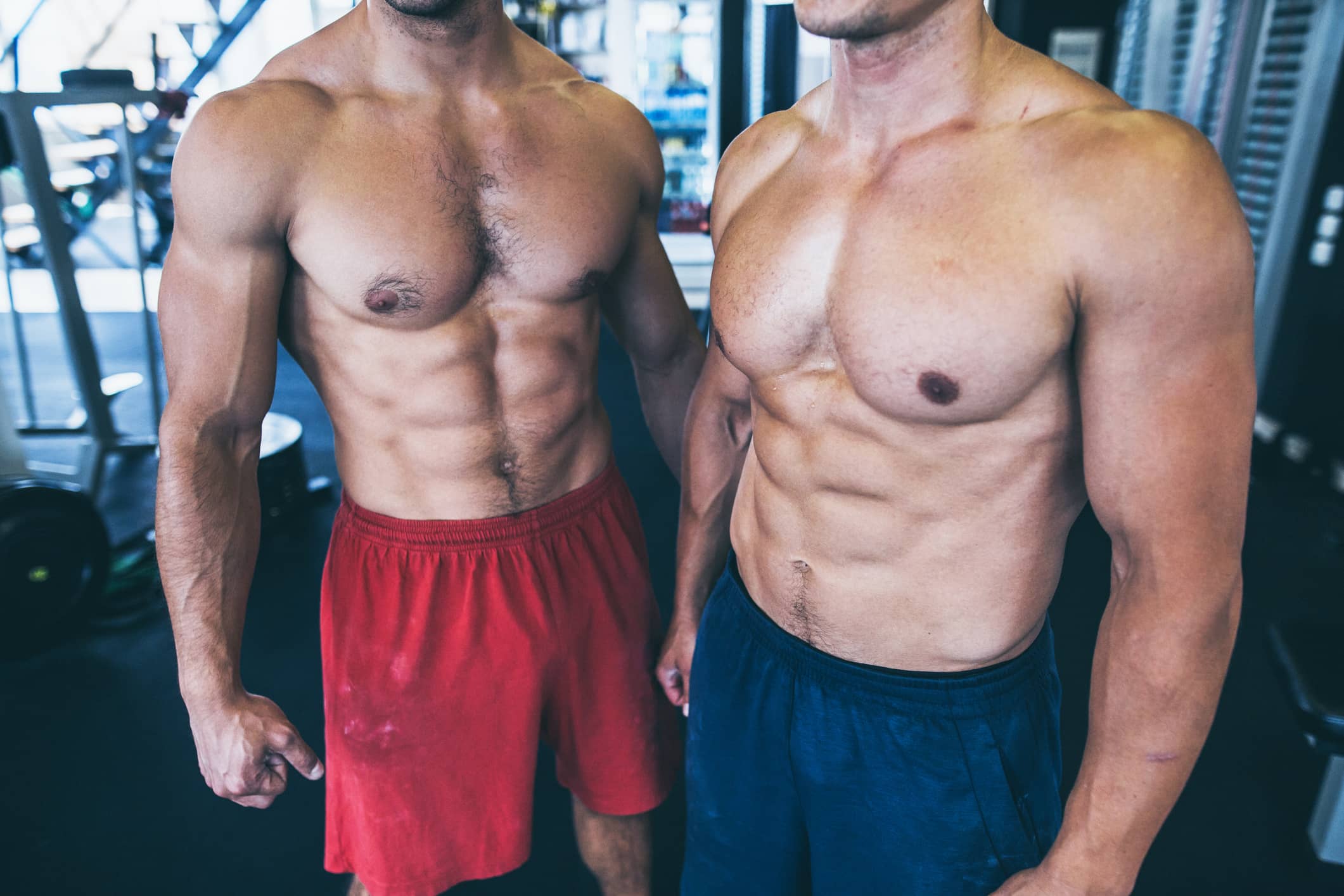
BLOG
The Best Muscle Building Foods

Building lean muscle
Before we start, let’s be pedantic for a moment and state that there is really no such thing, for humans, as ‘lean muscle’. It’s just muscle. Yes, there is a small amount of intramuscular fat between the fibres but we humans are not cattle where fat-marbling is desirable, so all muscle is lean.
When people talk about ‘lean muscle’, they are really conflating ‘lean body mass’, ‘muscle’ and ‘looking lean’. This article is about gaining lean mass (skeletal muscle).
If you’ve already had a DEXA body scan and your muscle mass is low (determined by your lean mass index or LMI), you’ll be keen to turn things around.
The primary driver behind increases in muscle mass (hypertrophy) is the work done in the weights room. Nutrition, with an emphasis towards protein intake, does play a role in enhancing the anabolic (muscle building) effect of weight training and acts as a building block to form new muscle tissue.
Eating sufficient calories is another important nutritional consideration. For most individuals, eating in an energy surplus is likely optimal to promote muscle building and to support progressive training demands.
A net energy surplus, however, is not mandatory for hypertrophy to occur and body recomposition (the simultaneous loss of body fat and gain in muscle tissue) is possible and even expected in certain scenarios – for example, individuals with high body fat levels and/or less weight training experience.
Without sufficient weight training stimulus, protein or energy (calories), you will see little if any gains no matter how hard you work.
The best muscle building foods are those high in protein. High protein foods also help to keep a lid on body fat gain because the body uses more energy when digesting protein than it does with fat and carbohydrates plus protein is more satiating. So, all in all, protein-rich foods are worth adding to your basket when you shop.
The right food to eat for building muscle – protein sources and considerations
Depending on your dietary preferences, your protein choices can range from higher and lower quality sources. Plant-based protein sources tend to be incomplete (missing certain amino acids) whereas animal-based protein will tend to have a complete amino acid profile.
The more restrictive your dietary preferences are with regards to protein sources (eg, a vegan diet), the more you will have to micromanage your intake. In such scenarios, focus on hitting your total protein targets over the day with a variety of protein sources as this will ensure you’re getting all the essential amino acids to maximise your muscle gain potential.
Leucine
One of the key amino acids involved in muscle building is leucine. Leucine is one of the triggers for muscle protein synthesis (MPS, the process of building of new muscle). Leucine also plays a role in the recovery process, muscle protection, and improved strength in older adults, especially those with sarcopenia, the age-related loss of muscle tissue.
Leucine is a present in all proteins, although more abundant in those of animal origin. A threshold amount of leucine of 2-3g is thought to maximally stimulate muscle protein synthesis. Depending on the source and the meal composition this can be anywhere between about 25g and 40g of a high-quality protein source.
Just because MPS is maximised at a given threshold does not mean the rest of the protein is wasted. The line ‘you can only absorb 30g of protein at one sitting’ is a myth! The remaining digested amino acids will continue to trickle into your blood stream, and help with minimising another process known as muscle protein breakdown. Furthermore, some of the amino acids will be converted to glucose for energy.
Here are some of the best foods for building muscle
Listed below are twenty great muscle-building foods, by way of being rich protein sources. Each food’s leucine, total protein, and calorie content per 100g is given.
| Food | Leucine (g/100g) | Protein (g/100g) | Energy (kcal/100g) |
|---|---|---|---|
| Chicken breast | 2 | 23 | 100 |
| Turkey breast | 2 | 24 | 107 |
| Beef rump | 1.9 | 22 | 111 |
| Cod | 1.5 | 17 | 71 |
| Prawns | 1.2 | 14 | 63 |
| Mackerel | 1.6 | 17 | 170 |
| Salmon | 1.5 | 18 | 185 |
| Smoked salmon | 2.1 | 25 | 147 |
| Tuna | 1.9 | 22 | 159 |
| Greek yogurt (low fat) | 0.7 | 9 | 51 |
| Feta | 1.5 | 16 | 250 |
| Mozzarella | 1.4 | 19 | 253 |
| Eggs | 1 | 12 | 128 |
| Beans | 0.5 | 6 | 104 |
| Chickpeas | 0.5 | 7 | 132 |
| Lentils | 0.5 | 7 | 109 |
| Dried peas | 1.4 | 22 | 306 |
| Spinach | 0.3 | 3.4 | 31 |
| Cashew nuts | 1.3 | 15 | 604 |
| Pine nuts | 2.1 | 32 | 604 |
Reference: (Rondanelli et al, 2021)
Resistance-based exercise supported by a diet of protein-rich wholefoods like those above is a great combination for optimised muscle development. Be consistent with both aspects and you should soon see good results.
Great supplements to help build muscle
Whey protein is one of two proteins found in milk. Owing to its amino acid profile and rapid rate of digestion, whey is a great quality protein helping to repair and rebuild damaged lean muscle tissue. Given its price and portability, it is also a very convenient way to increase your daily protein intake. Plant-based alternatives such as a pea protein blend are comparable to whey in terms of its leucine content and equally effective for building muscle.
Creatine monohydrate is possibly the most research-proven supplement on the market. Performance benefits include increased strength and muscle mass, plus improved recovery between training sessions. Take 3-5g per day with a meal year-round. An absolute no-brainer for anyone looking to build muscle!
Coffee (caffeine) is a powerful stimulant, and it can be used to improve physical strength and endurance. A strong shot or two of coffee 45-60 minutes before your workout will help provide focus and concentration. That explains why caffeine is the main ingredient in pre-workout drinks! Don’t consume caffeine much after 2pm as it will impact the quality of your sleep, and sleep is very important for rest and recovery, the period during which muscles repair themselves and grow.
How much protein should I eat for muscle gain?
A review paper published in 2018 concluded that a total daily protein intake beyond ~1.6g per kg of body weight did not provide further benefit on gains in muscle mass and strength during resistance training for the vast majority.
However, to quote the authors ‘it may be prudent to recommend ~2.2 g protein/kg/day for those seeking to maximise resistance training-induced gains in muscle’. It is worth pointing out that the analysis did not include dieting conditions (eg, being in a net calorie deficit).
Greater than ~1.6g daily protein per kg of body weight may help control hunger and minimise excess fat gain as protein is more satiating than carbohydrate and fat.
Protein intake should be individualised depending on your body composition (levels of body fat and importantly lean mass), goals, and training demands.
For those looking to optimise gains in muscle mass, aiming for an intake between ~1.6-2.2g per kilo of body weight is recommended. Ideally, you should determine your protein intake based off your total lean mass (following a DEXA scan). Somewhere between 2.3-3.2g of daily protein per kg of lean mass is a reasonable range for most.
Once suitable energy and protein intakes have been established, the quality, distribution, timing, and type of protein, are the final adjustments to consider in order to maximise muscle gain in response to training.
Where possible, aim to have at least three protein feedings evenly spread throughout your day. Pragmatically, six protein meals/snacks would be the upper limit so anywhere between three-to-six protein-based meals and snacks works well for most.
It takes multiple hours to digest and absorb protein. So if you’re eating three or more protein- containing meals per day, chances are you’re going to be digesting protein and have amino acids (the building blocks of protein) circulating in your body almost constantly. As a result, you’ll have protein available to start the repair and recovery process for most of the day.
A brief note on carbohydrates
To maximise weight training performance, consumption of a carbohydrate- and protein-containing meal/snack a couple of hours prior to your training session is encouraged. If you prefer or your schedule dictates training in the fasted state, be sure to consume a protein- containing meal, snack, or shake soon after (<90 minutes) your training session for best practice.
Building lean muscle – a summary
Total energy intake plays a crucial role in maintaining or gaining muscle mass, with a small energy surplus giving the best rates of muscle gain. Further, foods high in protein and leucine should be added to your muscle-building diet. Muscle gain is a slow and inefficient process that cannot be force-fed – if you overshoot the calorie requirement required to maximise muscle building, unwanted fat gain will occur. Strive for consistency at a reasonable rate of weight gain and be patient!
To sum up, a well-designed weight training program will provide a powerful anabolic stimulus for muscle growth and is by far and away the greatest contributor to gains in muscle mass. Nutrition will merely augment the muscle building response. Do both consistently and you’re golden!
Kevin Garde
Nutritionist and Bodyscan Consultant


Leave a Reply
You must be logged in to post a comment.